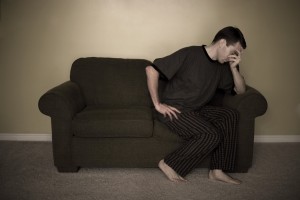 When I started this blog, I had just been diagnosed with panic disorder and agoraphobia, which was my first official diagnosis. That was over three years ago now. I now don’t even meet the criteria for panic disorder – yay me! But what does this really mean? Am I truly recovered? Has my anxiety been expelled from my mind, much like a demon might be exorcised in a horror movie?
When I started this blog, I had just been diagnosed with panic disorder and agoraphobia, which was my first official diagnosis. That was over three years ago now. I now don’t even meet the criteria for panic disorder – yay me! But what does this really mean? Am I truly recovered? Has my anxiety been expelled from my mind, much like a demon might be exorcised in a horror movie?
These are difficult questions to answer. First off, my anxiety is certainly not gone – I still struggle with social anxiety and there are still things that trigger my panic response. I have to closely watch how often I’m eating to keep my blood sugar stable, I have to remember my deep breathing techniques, and I have to keep a healthy balance of not avoiding my anxiety triggers but also not surrounding myself with them.
Even once you recover from an anxiety disorder, you never truly get rid of the anxiety. It lingers around you, a ghost of its former self, but present nonetheless. I may not have a panic attack when I try to board a bus, but I still get uncomfortable if I don’t show up much earlier than the departure time, and sometimes I still get that tight feeling in my chest while riding the bus, reminding me that I don’t like being confined into a small space for a long period of time. I like having escape routes thanks to the agoraphobia I once suffered from.
Something that I’ve learned over the past few years is to keep everything relative. Sure, I still suffer from some anxiety, more than most people, and yeah it sucks. But when I started this blog, my anxiety was crippling me, strangling me so that I couldn’t complete the simplest of tasks like going grocery shopping or working out at the gym. Compare yourself not to other people, but rather to the old you. If you’re doing better now than you were in the past, that’s progress – and that’s what counts.
It’s important also to continue with the treatments and techniques that helped you overcome your anxiety disorder. For me, it’s been a lot of mindfulness, breathing techniques, and positive visualization. I believe that I’m in control of my mood (to a certain degree) and I have to keep believing that, lest the anxiety take its grips on me once again. I’ve learned to talk about my feelings more often – telling people I’m anxious helps me intellectualize things, to hear my feelings out loud helps me to control them. Whatever techniques you used to overcome your anxiety, don’t forget them once you’re feeling better. Maybe you don’t need to practice them as often as during your recovery process, but always keep them in mind.
One last thing I wanted to say was that I realize many people who might stumble across this blog are not yet recovered. Don’t get discouraged that other people have overcome something you haven’t – remember, don’t compare yourself to other people, compare yourself to yourself. Every little step counts, every time you can make it out the door and walk around the block is a small victory. I have reached recovery, and you can too!









